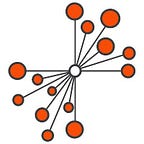Meet the winner -Stuart Macpherson
Scientists have a responsibility to disseminate knowledge for the benefit of society. As a researcher of solar energy materials, I challenged myself to create forward-thinking, solutions-based projects to engage young people with issues surrounding climate, energy and sustainable living. The supportive environment of my research group provided me with an ideal space to develop approaches to connect with young people of all backgrounds in an inclusive manner, and to energise them on sustainability issues. I hope this award will help to stimulate further growth of these projects and I am deeply grateful for the recognition.
Children are awake to the issues facing our planet and we must prepare them for future hurdles by teaching solutions and fostering skills. Since 2019 I have been co-developing two educational outreach programmes to supply primary school children with the knowledge to generate progressive and innovative ideas, enabling them to renovate the world to their own modern vision. The foundation of these projects is rooted the engagement of schools in regions with low levels of participation in higher education, as indicated by POLAR4 [1]. To achieve intergenerational equity, all young people must first have equal opportunities. In 2021 I will take the exciting step of co-founding a non-profit organisation (“Sustain/Ed”) that will build on our existing projects and whose primary objective is to provide free educational resources with climate, equality, and sustainability themes at the core. These resources will be accessible to all.
Ongoing projects:
“The Primary School Energy Mapping Challenge” (https://energymap.oe.phy.cam.ac.uk/) is a national (soon-to-be international; Ethiopia, USA) project which places children in the shoes of scientific researchers and tasks them with investigating the renewable energy potential of their school playground, promoting student leadership and boosting scientific curiosity and confidence. Multiple classes from eight different schools across the UK have taken part since 2019 and despite the disruption of the pandemic, the programme continues to expand in 2021. A different pair of students are responsible for measuring the sunlight and wind speed each day, before logging the data online and comparing their results with schools across the country. Students meet clean energy concepts face to face and tackle decisions surrounding to geographical variations in our natural resources.
“Bright & Breezy” is an 8-week multidisciplinary learning module produced to augment the UK Year 5/6 school curriculum, offering activities which reinforce awareness of human relationships with energy and climate while offering young people tools and solutions with which to attack the problems facing our world. The program is currently being tested in collaboration with the Cambridge University Primary School and we hope to roll-out our resources nationwide, in the next school year. Our uniquely interactive materials are game-changing in the engagement of young people with local sustainable energy solutions, while also uniting children across the country as part of something bigger.
In 2021 our outreach programmes will expand into a non-profit organisation with a variety of educational platforms encompassing lessons of sustainable living and equality ideals. “Sustain/Ed” is guaranteed to provide this through free, open-access resources. Future branches of the organisation will include a network for teachers to share and develop sustainability-themed resources, and a hub for citizens to learn about and locate local environmental or social projects with which they can get involved.
Most importantly I must thank two people for driving and supporting this work. My teammate and co-developer, Dr Beth Tennyson, has been with me every step of the way and is equally passionate about engaging with the next generation. My PhD supervisor, Dr Sam Stranks, has advised and encouraged our developments, and crucially provides us the space to work on outreach activities. The role of universities and colleges in society is vital beyond the educational and vocational opportunities they offer. All students should be afforded the same space to explore new ideas and unleash their creativity. Whether working independently or with an organisation such as the Cambridge Hub, I would encourage all students to seek out this space and to use it to engage with social causes. Our collective efforts will make a huge difference.
